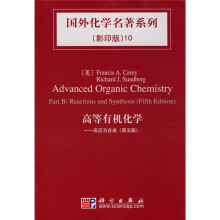Preface
Acknowledgment and Personal Statement
Introduction
Chapter 1. Alkylation of Enolates and Other Carbon Nucleophiles
Introduction
1.1. Generation and Properties of Enolates and Other Stabilized Carbanions
1.1.1. Generation of Enolates by Deprotonation
1.1.2. Regioselectivity and Stereoselectivity in Enolate Formation from Ketones and Esters
1.1.3. Other Means of Generating Enolates
1.1.4. Solvent Effects on Enolate Structure and Reactivity
1.2. Alkylation of Enolates
1.2.1. Alkylation of Highly Stabilized Enolates
1.2.2. Alkylation of Ketone Enolates
1.2.3. Alkylation of Aldehydes, Esters, Carboxylic Acids, Amides, and Nitriles
1.2.4. Generation and Alkylation of Dianions
1.2.5. Intramolecular Alkylation of Enolates
1.2.6. Control of Enantioselectivity in Alkylation Reac:ions
1.3. The Nitrogen Analogs of Enols and Enolates: Enamines and Imine Anions
General References
Problems
Chapter 2. Reactions of Carbon Nucleophiles with Carbonyl Compounds
Introduction
2.1. Aldol Addition and Condensation Reactions
2.1.1. The General Mechanism
2.1.2. Control of Regio- and Stereoselectivity of Aldol Reactions of Aldehydes and Ketones
2.1.3. Aldol Addition Reactions of Enolates of Esters and Other Carbonyl Derivatives
2.1.4. The Mukaiyama Aldol Reaction
2.1.5. Control of Facial Selectivity in Aldol and Mukaiyama Aldol Reactions
2.1.6. Intramolecular Aldol Reactions and the Robinson Annulation
2.2. Addition Reactions of Imines and Iminium Ions
2.2.1. The Mannich Reaction
2.2.2. Additions to N-Acyl Iminium Ions
2.2.3. Amine-Catalyzed Condensation Reactions
2.3. Acylation of Carbon Nucleophiles
2.3.1. Claisen and Dieckmann Condensation Reactions
2.3.2. Acylation of Enolates and Other Carbon Nucleophiles
2.4. Olefination Reactions of Stabilized Carbon Nucleophiles
2.4.1. The Wittig and Related Reactions of Phosphorus-Stabilized Carbon Nucleophiles
2.4.2. Reactions of a-Trimethyisilylcarbanions with Carbonyl Compounds
2.4.3. The Julia Olefination Reaction
2.5. Reactions Proceeding by Addition-Cyclization
2.5.1. Sulfur Yiides and Related Nucleophiles
2.5.2. Nucleophilic Addition-Cyclization of ot-Haloesters
2.6. Conjugate Addition by Carbon Nucleophiles
2.6.1. Conjugate Addition of Enolates
2.6.2. Conjugate Addition with Tandem Alkylation
2.6.3. Conjugate Addition by Enolate Equivalents
2.6.4. Control of Facial Selectivity in Conjugate Addition Reactions
2.6.5. Conjugate Addition of Organometallic Reagents
2.6.6. Conjugate Addition of Cyanide Ion
General References
Problems
Chapter 3. Functional Group Interconversion by Substitution, Including Protection and Deprotection
Introduction
3.1. Conversion of Alcohols to Alkylating Agents
3.1.1. Sulfonate Esters
3.1.2. Halides
……
Chapter 4. Electrophilic Additions to Carbon-Carbon Multiple Bonds
Chapter 5. Reduction of Carbon-Carbon Multiple Bonds, Carbonyl Croups, and Other Functional Groups
Chapter 6. Concerted Cycloadditions, Unimolecular Rearrangements, and Thermal Eliminations
Chapter 7. Organometallic Compounds of Group I and II Metals
Chapter 8. Reactions Involving Transition Metals
Chapter 9. Carbon-Carbon Bond-Forming Reactions of Compounds of Boron, Silcon, and Tin
Chapter 10. Reactions Involving Carbocations, Carbenes, and Radicals and Reactive Intermediates
Chapter 11. Aromatic Substitution Reactions
Chapter 12. Oxidations
Chapter 13. Multistep Syntheses
References
Index

 缺书网
缺书网 扫码进群
扫码进群






